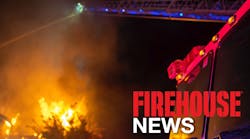These kinds of dilemmas have become increasingly common to employees in all walks of life. Firefighters are no exception. Thus, in 1993, Congress enacted the Family and Medical Leave Act.
This law, which covers some 67 million employees, requires that all public employers (and private employers with more than 50 employees) provide up to 12 weeks of unpaid leave each year for absences due to:
- Birth of a child.
- Adoption of a child.
- Need to care for an immediate family member (a spouse, child or parent) because of a serious health condition.
- A serious health condition that makes the employee unable to perform his or her job.
An employee's health insurance must be continued in effect during this time. Further, the law prohibits employers from discriminating against employees who take family leave. This means that the fire department must reinstate the employees to the same or an equivalent position upon return to work. They must be given equivalent pay, benefits, status and authority. Further, an absence on family leave cannot be used as a negative factor in performance evaluations, decisions about bonuses, promotions or disciplinary actions. It is illegal to deny a promotion because the employee took family leave for an extended period.
The law also gives employers options. In order to be eligible for family leave, the employee may be required to have worked for at least 1,250 hours over the previous 12 months. The leave can be limited to 12 weeks in the past 12 months. The employer may insist that the employee use all accrued sick and annual leave as a part of the 12-week period. In other words, the employee may be prevented from using accrued leave in addition to the permitted family leave. Also, the employer may require 30 days' advance notice before the beginning of the family leave, if the leave was foreseeable.
If an employee uses family leave for a personal medical condition, the employer may require medical certification of need for leave or require a fitness-for-duty certificate upon returning from leave. This is likely in the fire service, which often is stressful and requires significant physical abilities. The law also appears to authorize the longstanding fire service practice of assigning injured personnel or those with a medical problem to light duty.
There also are provisions for part-time employees. The leave entitlement is calculated on a pro rata basis for part-time employees and those who work variable hours. The weekly average of the hours worked during the 12 weeks prior to the beginning of the leave would be used for calculating the employee's normal work week.
An employee may take this leave intermittently (a few hours or days at a time) either to care for a family member or because of his or her own medical necessity. This would be especially helpful when there is a need for frequent medical appointments. If an employee takes this intermittent leave for birth or for an adoption, however, it can be done only with the department's consent.
This option can create special problems for fire departments that must provide continuous coverage throughout the shift for each position on the apparatus. Thus, the law permits an employee to be transferred temporarily to a position (with equivalent pay and benefits) that better accommodates these recurring absences. A firefighter may be transferred to a fire prevention or administrative position. Again, however, the employee must be returned to prior status at the end of the absences.
There are some important requirements upon fire service managers whenever an employee requests a leave of absence. The department must provide the employee with an individualized, written notice of his or her rights and responsibilities. This notice must advise the employees that the leave will be counted toward their 12-week-per-year entitlement, that they will be restored to the same or an equivalent positions following the leave, if a fitness-for-duty certification will be required upon return, if paid leave will be substituted for unpaid leave, and other matters regarding health insurance and other benefits.
Failure to give proper notice can create both significant liabilities and embarrassment for the department. For example, the leave cannot be counted against the employee's 12-week entitlement if this notice has not been provided. Or, if the notice does not set forth the requirement that a fitness-for-duty certificate will be required upon return to work, the department cannot request such a certification.
The U.S. Department of Labor has provided assistance to fire departments and other employers in meeting this notice requirement. It has issued a notification form that conveys all of the required information. By inserting brief narrative information and checking various boxes, the department can convey all of the required information. Further, since the form has been issued by the federal agency that wrote the regulations implementing the law, it can be presumed to be effective notification if it is properly completed.
The Labor Department reports that more than 6,300 complaints had been filed against employers for failing to comply with the law as of Sept. 30, 1996. Almost 60 percent were found to be apparent violations. The most common violation was employer refusal to reinstate the employee to the same or a similar position held before taking the leave. A far smaller portion of the violations found were for employers refusing to grant the leave when it was required.
It is important that fire service leaders at all levels be aware of these requirements. Whenever an employee requests family leave (whether verbally or in writing, and whether by name or not), the department's human resources division should be notified immediately. Needless to say, fire department human resources offices need to be thoroughly familiar with this law and to have carefully planned procedures for responding to family leave requests.
Not surprisingly, the law has been quite popular with employees. It is reasonable to expect that an increasing number of fire service personnel will use it when confronted with difficult family situations. Recognizing this, the Labor Department's Wage and Hour Division has established a toll-free number 1-800-959-FMLA that provides a brief description of the law and enables callers to request more detailed information to be sent through the mail. This should prove to be valuable for both fire departments and their employees.
Steve Blackistone, a Firehouse® contributing editor, is an attorney and a member of the Bethesda-Chevy Chase Rescue Squad in Montgomery County, MD.




